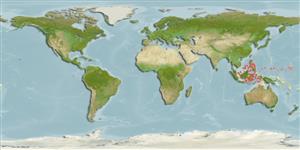Common names from other countries
Klassifizierung / Names
Namen | Synonyme | Catalog of Fishes(Gattung, Arten) | ITIS | CoL | WoRMS | Cloffa
>
Gobiiformes (Gobies) >
Gobiidae (Gobies) > Gobiinae
Etymology: Eviota: No etymology given, suggested by Christopher Scharpt: from Latin 'eu' for 'true' and 'iota' for anything very small, in combination 'truly very small' referring to it as being the smallest vertebrate at the time it has benn described by Jenkins (thus, making the suggestion by Scharpt plausible.; asymbasia: Name from Greek 'asymbasia' meaning inconsistency; referring to the variability of the presence of the preopercular pores..
Environment: milieu / climate zone / depth range / distribution range
Ökologie
seewasser riff-verbunden; tiefenbereich 1 - 14 m (Ref. 108789). Tropical
Verbreitung
Länder | FAO Gebiete | Ecosystems | Vorkommen | Point map | Einführungen | Faunafri
Western Pacific: the Philippines and Indonesia.
Size / Gewicht / Alter
Maturity: Lm ? range ? - ? cm
Max length : 1.7 cm SL Männchen/unbestimmt; (Ref. 108789); 1.5 cm SL (female)
Kurzbeschreibung
Morphologie | Morphometrie
Rückenflossenstacheln (insgesamt): 7; Rückenflossenweichstrahlen (insgesamt): 8; Afterflossenstacheln 1; Afterflossenweichstrahlen: 8. This species is distinguished from its congeners by the following set of characters: cephalic
sensory-pore system always lacking the IT, usually the POP, but occasionally the POP is present on both or only one side of the head; dorsal/anal-fin formula of 8/8, some branched pectoral-fin rays and usually 15 rays, pectoral-fin base with 2 spots; preural centrum without dark spot; first dorsal fin may be filamentous; ventral postanal spots 6; male genital papilla not fimbriate (Ref. 108789).
Life cycle and mating behavior
Geschlechtsreife | Fortpflanzung | Ablaichen | Eier | Fecundity | Larven
Greenfield, D. and S.L. Jewett, 2016. Two new dwarfgobies from the Indian and Western Pacific Oceans (Teleostei: Gobiidae: Eviota). Zootaxa 4121(5):589-599. (Ref. 108789)
IUCN Rote Liste Status (Ref. 130435)
CITES (Ref. 128078)
Not Evaluated
Bedrohung für Menschen
Harmless
Nutzung durch Menschen
Mehr Information
LänderFAO GebieteEcosystemsVorkommenEinführungenStocksÖkologieNahrungNahrungsorganismenNahrungsaufnahmeNahrungsmenge
NamenSynonymeMetabolismusRäuberÖkotoxikologieFortpflanzungGeschlechtsreifeAblaichenFecundityEierEientwicklung
Alter/GrößeWachstumLänge-GewichtLänge-LängeLängenhäufigkeitenMorphometrieMorphologieLarvenLarven Pop.Dyn.RekrutierungDichte
ReferenzenAquakulturAquakultur ProfilZuchtlinienGenetikElectrophoresesVererbbarkeitKrankheitenVerarbeitungMass conversion
PartnerBilderStamps, Coins Misc.LauteCiguateraGeschwindigkeitSchwimmstilKiemenoberflächeOtolithsGehirngrößeSehfähigkeit
Tools
Zusatzinformationen
Download XML
Internet Quellen
Estimates based on models
Phylogenetic diversity index (Ref.
82804): PD
50 = 0.5000 [Uniqueness, from 0.5 = low to 2.0 = high].
Bayesian length-weight: a=0.00708 (0.00333 - 0.01504), b=3.09 (2.92 - 3.26), in cm Total Length, based on LWR estimates for this (Sub)family-body shape (Ref.
93245).
Trophic level (Ref.
69278): 3.0 ±0.3 se; based on size and trophs of closest relatives
Widerstandsfähigkeit (Ref.
120179): hoch, Verdopplung der Population dauert weniger als 15 Monate. (Preliminary K or Fecundity.).
Fishing Vulnerability (Ref.
59153): Low vulnerability (10 of 100).
